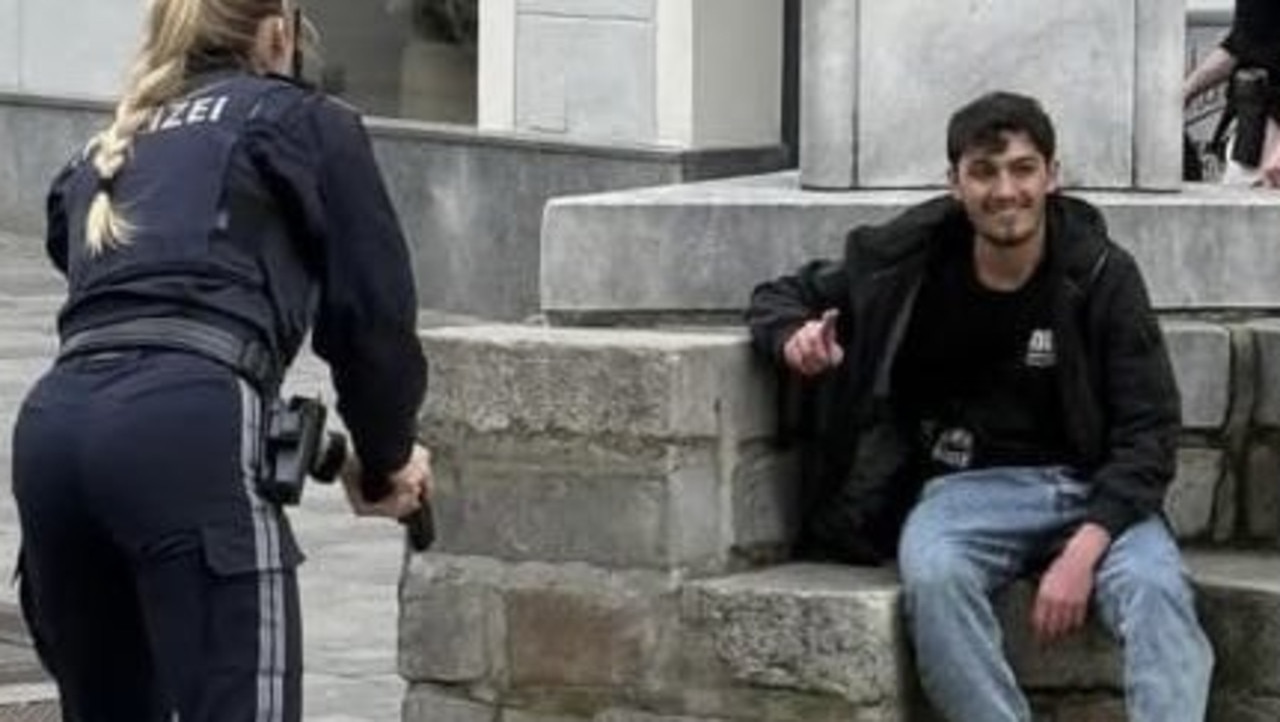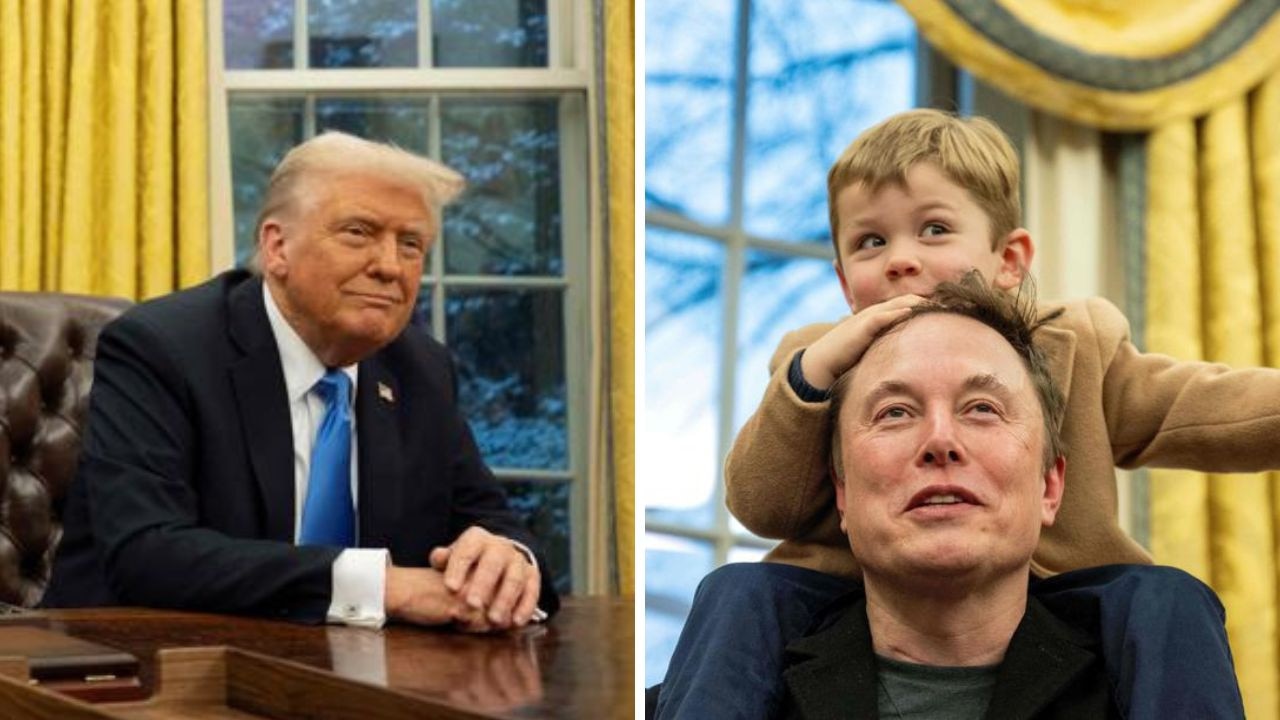Champagne-sipping Putin says Russian strikes on Ukrainian energy infrastructure will continue
Vladimir Putin has sought to justify Russia’s use of missile strikes while vowing to continue attacking Ukraine as he attended a champagne reception in the Kremlin. See the video.
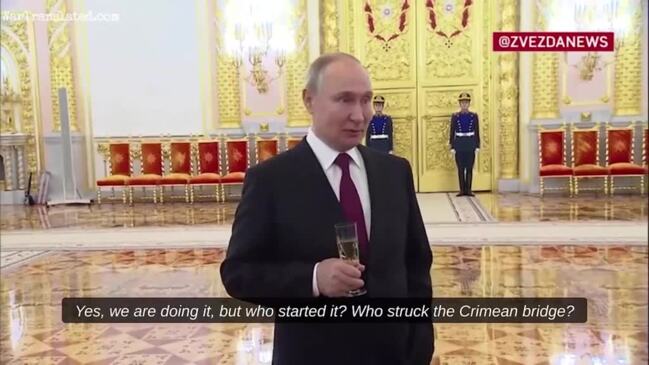
World
Don't miss out on the headlines from World. Followed categories will be added to My News.
Russian President Vladimir Putin has justified the country’s use of missile strikes on Ukraine’s energy infrastructure by claiming they “Ukrainians started it”.
Holding a champagne in his hand, Mr Putin spoke at a grandiose Kremlin reception, which was held to recognise several Russian servicemen as ‘Heroes of Russia’ for their efforts in Ukraine.
“There is a lot of noise now about our strikes on the energy infrastructure [of Ukraine]. Yes, we are doing it,” he told reporters.
“But who started it? Who struck the Crimean bridge?’ Putin quipped, clutching a glass of champagne as he shuffled awkwardly from side to side, looking unsteady on his feet.”
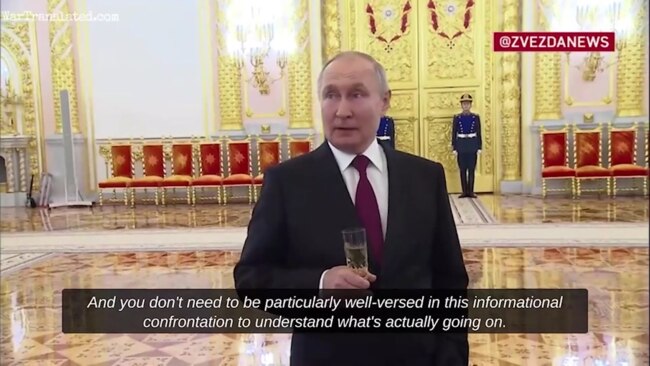
Millions of Ukrainians have been left facing a “winter apocalypse” and without , heat and water as temperatures plummet below freezing after Russia’s relentless attack on their energy infrastructure.
Mr Putin later vowed to achieve his goals in Ukraine as “a duty to our people”, irrespective of any “information wars” or outrage in response to Moscow’s actions.
“When we make a move there is an outburst of noise and chatter throughout the universe... This will not prevent us from fulfilling our military objectives,” he said.
VOLODYMYR ZELENSKYY NAMED TIME ‘PERSON OF THE YEAR’
Time Magazine has named Ukrainian President Volodymyr Zelenskyy and “the spirit of Ukraine” as its 2022 Person of the Year.
The historic honour, first awarded to aviator Charles Lindbergh in 1927, goes to an event or person deemed to have had the most influence on global events over the past 12 months.
Mr Zelenskyy’s selection is commemorated with a special Time cover, as well as an exclusive interview published both in the print double-issue and online.
Mr Zelensky, 44, gained international recognition upon Russia’s invasion of Ukraine on February 24. Almost 10 months later, he remains a symbol of the nation’s stoicism and spirit in the face of the incursion.
The magazine’s editor said the decision was “the most clear-cut in memory”.
“In a world that had come to be defined by its divisiveness, there was a coming together around this cause, around this country,” Edward Felsenthal wrote.
Other finalists included protesters in Iran, China’s leader Xi Jinping and the US Supreme Court.
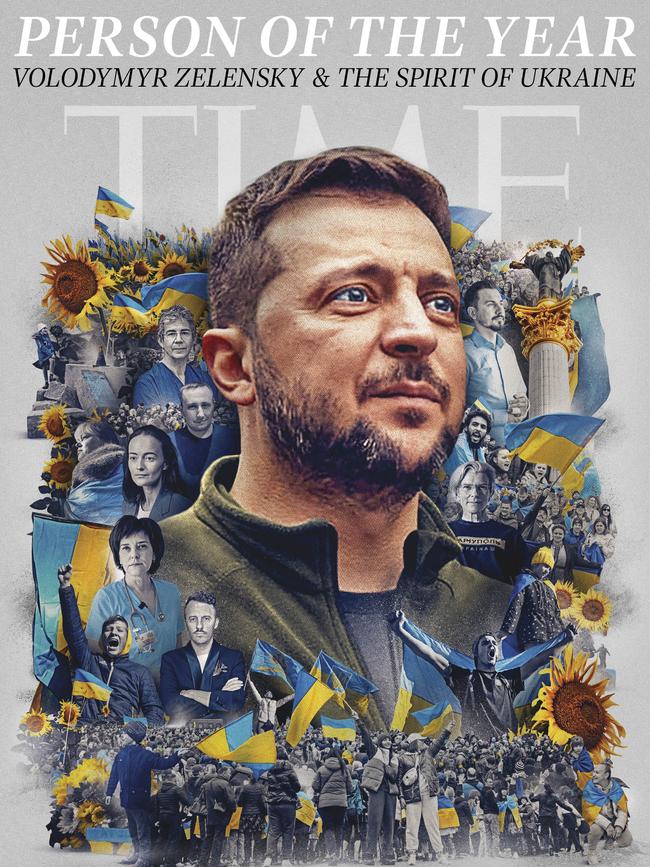
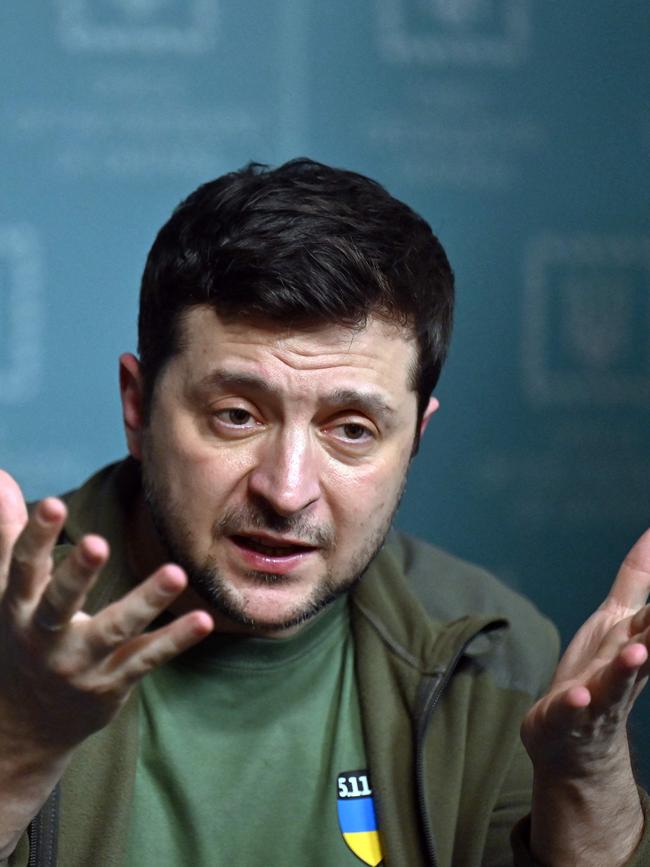
Mr Felsenthal added that the “spirit of Ukraine” referred to Ukrainians around the world, including many who “fought behind the scenes”.
This includes Ievgen Klopotenko, a chef who provided thousands of free meals to Ukrainians and medic Yuliia Payevska who was captured, then released after three months in Russian captivity.
The magazine said Mr Zelenskyy had inspired Ukrainians and was recognised internationally for his courage in resisting the Russian invasion.
“Zelenskyy’s success as a wartime leader has relied on the fact that courage is contagious,” it said.
Women in Iran were Time’s 2022 Heroes of the year and the K-pop band Blackpink were recognised as Time’s Entertainer of the year.
American baseballer Aaron Judge has been recognised as the Athlete of the Year and Malaysian actress Michelle Yeoh is the Icon of the Year.
Other past winners have included the former dictator of Germany, Adolf Hitler in 1938, and Russian President Vladimir Putin, who was 2007’s Person of the Year.
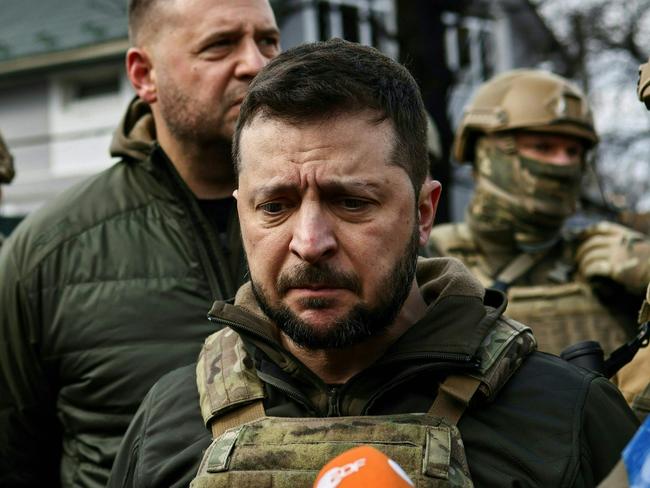
PUTIN SAYS THREAT OF NUCLEAR WAR RISING
Russian President Vladimir Putin has sent a chilling warning about the country’s use of nuclear weapons, saying the threat is “rising” while refusing to rule out if the country will strike.
Speaking at a televised meeting of his own Human Rights Council, Mr Putin said the threat of nuclear war is “on the rise”.
When one member asked him to swear off a first strike, he said: “In terms of the threat of nuclear war, you are right, such threat is rising.
“As for the idea that Russia wouldn’t use such weapons first under any circumstances, then it means we wouldn’t be able to be the second to use them either — because the possibility to do so in case of an attack on our territory would be very limited.”
“We have the most advanced weapons, but we do not want to wave it around.”
There have been growing fears that Mr Putin will use nuclear weapons after he forcibly drafted 300,000 reservists in a bid to revive his disastrous Ukraine war in September.
Since then he has personally overseen nuke drills which rehearsed wiping Britain and the US off the map.
In his latest announcement, Mr Putin also said Russia “will use all the means at our disposal to defend Russia and our people” adding “this is not a bluff”.
“As for the duration of the special military operation, well, of course, this can be a long process,” he said.
POLAND U-TURNS ON GERMAN PATRIOT MISSILES
Poland will accept long-range Patriot missiles from Germany after earlier calling on Berlin to send them to Ukraine instead.
“After talking to the German defence minister, it is with disappointment that I have accepted the decision to refuse support for Ukraine,” Poland’s Defence Minister Mariusz Blaszczak said on Twitter.
“Deploying the Patriots in western Ukraine would have increased Polish and Ukrainian security. We thus proceed to working arrangements regarding the placement of the launcher in Poland.”
A spokesman for the German defence ministry said the two countries had “a good discussion on Germany’s offer to deploy the German Patriot systems to Poland and they agreed on the principle.”
“Details like possible deployment locations and the necessary infrastructure are now being discussed at the technical level and a reconnaissance team is due to be sent immediately to Poland,” he told AFP.
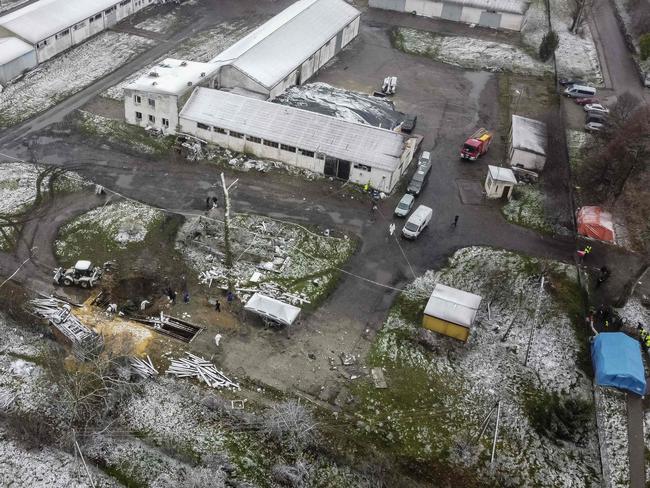
Germany had offered to deploy the advanced US-made Patriot system to Poland after a deadly blast believed to be from a stray Ukrainian air defence missile hit a Polish village last month.
But Polish authorities told Berlin to ship the system to Ukraine instead, to help Kyiv defend itself against the barrages of Russian missiles hitting the country.
Germany responded at the time that it would have to discuss with NATO any proposals to send the Patriot system to Ukraine as it was part of the alliance’s integrated defences.
NATO chief Jens Stoltenberg later said it was up to Germany to decide if it wanted to supply Patriot missile defences to Ukraine.
NATO allies have already funnelled billions of dollars’ worth of arms to Ukraine to help it fight back against the Russian invasion, including modern air defence systems.
Germany has provided Kyiv with the medium-range Iris-T system as part of an effort by Western nations to bolster Ukraine’s protection against Russian strikes.
But the United States and other NATO allies have steered clear of sending the long-range Patriot system to Ukraine.
The American system is a key part of the alliance’s air defences for its eastern flank.
Washington has already deployed Patriot missiles to Poland, an EU member, and Berlin has deployed them to Slovakia.
RUSSIAN AIRFIELD HIT
A drone has hit an airfield in Russia’s Kursk region bordering Ukraine, one day after Moscow blamed Kyiv for drone strikes at two other Russian airfields.
“As a result of a drone attack in the area of the Kursk airfield, an oil storage tank caught fire. There were no casualties,” local governor Roman Starovoyt said on Tuesday, adding that they were trying to contain the fire.
Mr Starovoyt did not specify where the drone originated.
On Monday, Russia’s defence ministry said Ukraine “attempted to strike” the Dyagilevo airfield in the Ryazan region and the Engels airfield in the Saratov region with “Soviet-made drones”.
The drones were intercepted but debris fell and exploded on the airfields, the ministry added.
Engels is a base for the country’s strategic aircraft that Kyiv says have been used to strike Ukraine.
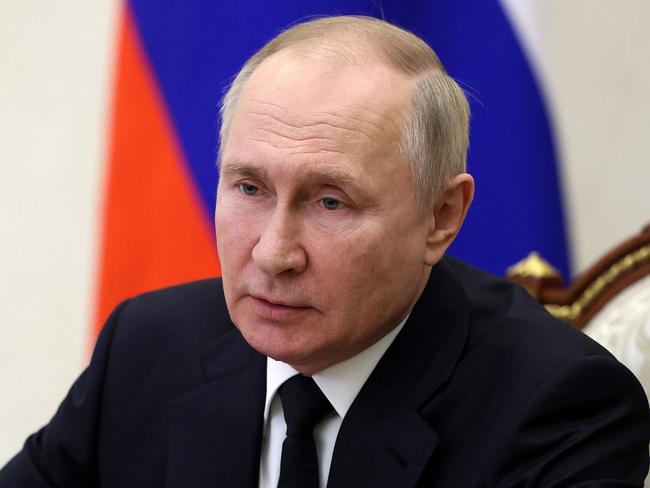
In a statement published by the official Russian news agency RIA Novosti, the ministry said the raids had been intercepted by its air defences. “On the morning of December 5, the (Kyiv) regime, in order to disable Russian long-range aircraft, attempted to strike with Soviet-made jet unmanned aerial vehicles (drones) at the Dyagilevo military airfields in the Ryazan region and Engels in the Saratov region,” the statement said.
As a result of those strikes three soldiers had been killed and four others injured, the ministry said without providing further details. Two planes were also slightly damaged.
The Kremlin has kept a tight lid on its human and material losses during Moscow’s offensive in Ukraine.
Monday’s drone strikes were highly unusual as both sites are hundreds of kilometres away from Ukraine’s border.
The Kremlin said on Tuesday that Russian President Vladimir Putin convened a meeting of his Security Council to discuss how to ensure the state’s “domestic security.” No other details were provided.
Speaking to reporters separately, Mr Putin’s spokesman Dmitry Peskov said authorities were taking “necessary” measures to protect the country from Ukrainian attacks.
“Of course, the line openly declared by the Ukrainian regime to continue such terrorist acts is a danger factor,” Mr Peskov told reporters when asked about the drone strikes.
– with AFP
More Coverage
Originally published as Champagne-sipping Putin says Russian strikes on Ukrainian energy infrastructure will continue



